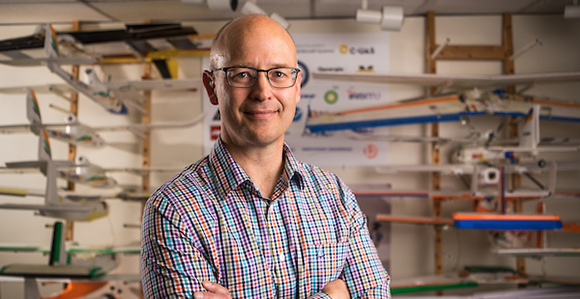BYU Professor Talks Future of Robotics, Says the Lord Guides His Research
Contributed By Kaitlyn Bancroft, Church News contributor

Dr. Randy Beard, an electrical engineering professor at Brigham Young University, says we are in the middle of a revolution in autonomous vehicles and intelligent machines.
Article Highlights
- We are in a revolution of autonomous vehicles.
- Seek heaven’s help in your academic pursuits and careers.
“The world needs hardworking individuals with technical expertise who are also in a position to receive the direction and the guidance that the Lord is able and willing to give.” —Randy Beard, BYU professor
President Russell M. Nelson once shared a story about standing in an operating room, not knowing how to proceed and pleading for heaven’s help.
It's a story that resonates with Randy Beard, an electrical engineering professor at Brigham Young University.
“I have obviously never been a doctor in an operating room, and my experiences have not been as dramatic, but there have been several times in my professional career when I have struggled with a technically challenging problem and have not known how to proceed,” he said. “I too have pleaded with heaven for help with those technical problems, all of which were related to unmanned autonomous robots. And there have been moments, a few precious moments, when light has poured into my mind with an idea that has enabled our research group to make progress.”
Beard, whose background is in robotics, shared his work during a BYU forum on May 22, where he received the Karl G. Maeser Distinguished Faculty Lecturer Award.
He began by outlining various kinds of autonomous vehicles, from vacuum cleaners to Mars rovers to drones. Beard said there are five different levels of autonomy, starting with no autonomy at 0 and full autonomy at 5. A Mars rover, where an operator gives high-level commands but the robot otherwise acts autonomously, is level 4; a robotic vacuum, which operates without human intervention, is level 5.
“There is no question that we are in the middle of a revolution in autonomous vehicles and intelligent machines in general,” Beard said.
This revolution is happening now, Beard said, because of the introduction of four key technologies in the 1990s: GPS, MEMS gyroscopes, small embedded computers, and high energy density batteries. These technologies meant “there was this perfect storm of available technologies” in the early 2000s, enabling unmanned aircraft and mobile robotics.
Beard continued by outlining in greater detail how autonomous robotics work and some of the projects he and his students have worked on; he also explored the potential legal and ethical issues surrounding self-driving vehicles, such as if the manufacturer, software engineer, or owner of the vehicle would be responsible for a serious accident.
Another example is if the brakes go out in a self-driving car and there is a choice to either run into a barrier that will likely kill the driver or turn into pedestrian traffic. Beard said we currently trust human drivers to make those split-second decisions.
“So what is the right answer?” he asked. “Would you buy a car that you knew was programmed to save the most lives possible, even if it was at the expense of you, the driver?”
Beard predicts that in five years, self-flying recreational vehicles will be available to the rich; in 10 years, level 4 autonomy will be a standard option on many cars; in 15 years there will be a strong transition away from car ownership; and in 20 years, self-flying taxis and cars will be an accepted part of transportation.
He closed by encouraging students to plead for heaven’s help and to receive the Lord’s help in academic pursuits and future careers by working hard.
“You too have great things to do,” he said. “Our society is facing many daunting challenges, and the world needs hardworking individuals with technical expertise who are also in a position to receive the direction and the guidance that the Lord is able and willing to give. You can be one of those individuals.”
